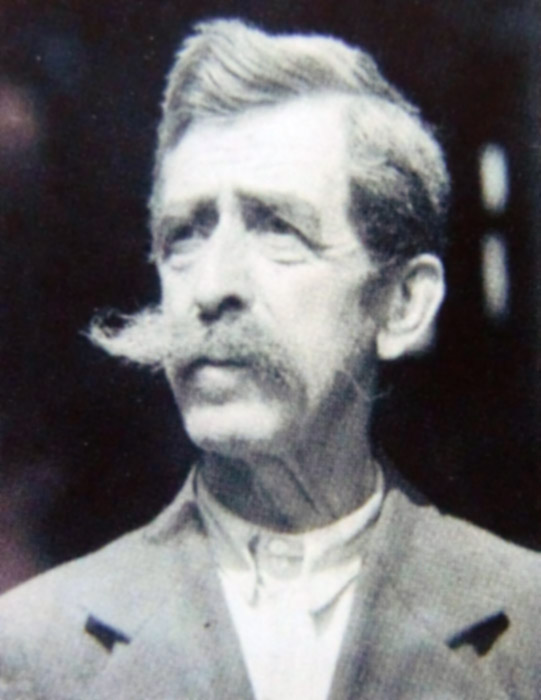On January 27, 2024, these
Zeitpunkte were installed near the address Defreggerstrasse 12. The initiative for this came from erinnern:at.
Wolf Meier (Max) Turteltaub
Born 30.11.1867 in Bohorodczany (Ukraine)
Died 1942 in Riga (Latvia)
Amalie Turteltaub, née Wolfart
Born 8.1.1871 in Stanislau (Ukraine)
Died 1942 in Riga (Latvia)
Margit (Gita) Scharf
Born 12.2.1932 in Wörgl
Died 1942 in Riga (Latvia)
Wolf Meier Turteltaub and his wife Amalie Wolfart were from Austrian Galicia. They moved to Vienna in the late 1890s, to Salzburg in 1903 and to Innsbruck at the end of 1905. In January 1911, Amalie bought the property at Defreggerstraße 12 in the working-class district of Pradl with loaned capital. There Wolf Meier opened the Fortuna instalment store.The couple had five children; Sofie, their sixth child, died at the age of nine months.
Their daughter Anna was married twice. She had a son called Erich from her marriage with Leo Weinreb and two children, Leopold und Margit (Gita), from her marriage with Salomon Scharf. Anna fell seriously ill and died in 1934 already, and the children grew up in the home of their grandparents.
The NSDAP’s takeover in 1938 devastated the lives of the Turteltaub family in all respects. The shop in Innsbruck was besmeared and boycotted. In the night of the pogrom on 10 November 1938, a group of thugs from the National Socialist Motor Corps severely maltreated 70-year-old Wolf Meier Turteltaub. They arrested him, his son Fritz, grandson Aldo and other relatives in an attempt to intimidate them into leaving Innsbruck.
This left Wolf Meier and Amalie Turteltaub with no choice but to move to Vienna with their son Fritz and grandchildren Erich, Leopold and Gita. There they lived in a miserable flat with one room and kitchen at Rembrandtstrasse 28. “Take a good look at Innsbruck. Who knows if you will see it again,” said Amalie Turteltaub to her grandchildren.
In Vienna, Wolf Meier Turteltaub and Erich spent their days calling at one consulate after another. But no one wanted to take old people. In April 1939, the grandfather was able to find places for Erich and Leopold on a refugee ship, which eventually reached Haifa. His son Fritz made it to England. The grandparents and six-year-old Gita remained in Vienna. Until the beginning of the war, it was possible to send letters to Palestine. Amalie Turteltaub wrote to her grandson Erich:
“Dear child, how dearly would we like to join you, but unfortunately it is not a matter of what we want. At the moment there are no prospects at all for us. Only a miracle could make it happen.” She also wrote: “Erich, see if you can get someone to make a request for Gita to come, for her to join you. She yearns terribly for you. She cries all the time, and when I ask her why she is crying, she says: Gramma, let’s go to Aunt Eva Erich Poldi Aldolo; I don’t want to wait so long. She doesn’t understand; she thinks you can just travel as you like, but I’m telling you, it’s unbearable, there’s no help for us at all.”
From September 1941, the family had to wear the Jewish star. On 26 January 1942, 70-year-old Amalie and 74-year-old Wolf Meier Turteltaub were deported together with ten-year-old Gita from Aspang railway station in Vienna to Riga. From there, all trace of them was lost.
Their son Edmund and his wife and two children were murdered in the Auschwitz concentration camp in 1944, their daughter Ella and her husband presumably in the Sobibór extermination camp, and the latter’s son in Auschwitz.
Sources:
Achrainer, Martin/Niko Hofinger: Die Turteltaubs: Eine Großfamilie zwischen jüdischer Tradition und österreichischem Alltag, in: Thomas Albrich (Hg.), “Wir lebten wie sie…”. Jüdische Lebensgeschichten aus Tirol und Vorarlberg, Innsbruck 22000, pp. 147-164.
Schreiber, Horst/Irmgard Bibermann (Hg.): Von Innsbruck nach Israel. Der Lebensweg von Erich Weinreb / Abraham Gafni, Innsbruck-Wien-Bozen 22019.
